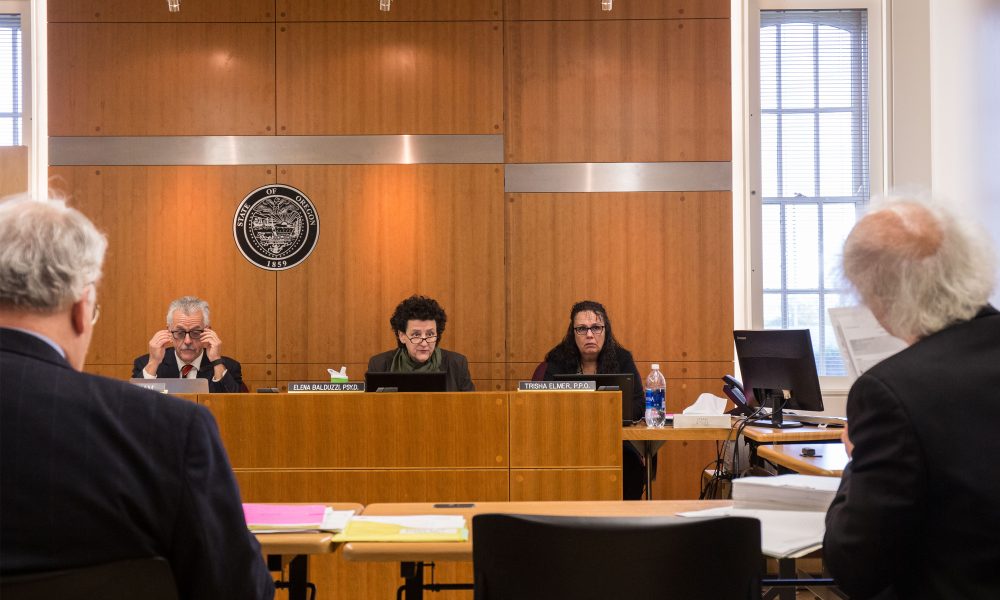 Members of the Psychiatric Security Review Board hear testimony at the Oregon State Hospital earlier this year. Pictured from left are John Swetnam, the public member; Chairwoman Elena Balduzzi, a pscyhologist; and Trisha Elmer, a parole and probation officer. The board also includes a psychiatrist, Dr. Scott Reichlin, and an attorney, Anne Nichol. (Photo special to the Enterprise/Bruce Ely)
Members of the Psychiatric Security Review Board hear testimony at the Oregon State Hospital earlier this year. Pictured from left are John Swetnam, the public member; Chairwoman Elena Balduzzi, a pscyhologist; and Trisha Elmer, a parole and probation officer. The board also includes a psychiatrist, Dr. Scott Reichlin, and an attorney, Anne Nichol. (Photo special to the Enterprise/Bruce Ely)
The top of the Oregon Psychiatric Security Review Board’s website boasts of its success in reforming people acquitted of crimes because of a mental disorder: “With public safety as its primary focus, the Board has an exceptional record of reintegrating clients into the community with a 6 year average 0.46% adult recidivism rate.”
In fact, a review of public records shows that the board has known that its record with clients after they are released is far less impressive. The 0.46 percent rate of recidivism refers only to people still in the board’s custody.
Board members have said it is not their duty to track what happens to people they set free.
“While any recidivism by any former client is concerning, our agency’s responsibility is to the clients under our jurisdiction,” board officials said in a statement on Oct. 5, 2018.
But in private, board members and staff pushed to study recidivism and found far higher rates among people the board releases. This timeline traces what board officials knew about a crucial issue of public safety and when they knew it.
September 2015
On Sept. 30, the board unanimously voted to free Charles Longjaw, despite warnings from a state psychologist that he was likely to resume his abuse of alcohol and drugs if the board released him from strict supervision. The psychologist said that once drunk or high, Longjaw would be unable to restrain impulses that had previously led to a brutal murder, an attempted murder and a vicious rape.
January 2016
Juliet Britton, executive director of the board from 2013 to 2018, began pushing for a study of recidivism among people discharged from board custody. Available records show she broached the idea as early as Jan. 4, 2016, in an email chain with the agency’s data analyst and three researchers she planned to join at an upcoming national conference. Britton’s email referred to Dr. Simrat Sethi, a psychiatrist who was then leading the Forensic Evaluation Service at the Oregon State Hospital.
“I think we would want to emphasize new data about outcomes, recidivism and rehabilitation, as well as ideas for a future research agenda,” wrote a state mental health official from Connecticut.
Britton replied, “I, along with Dr. Sethi (Oregon State Hospital) are very interested in this topic.”
May 2016
The idea gained momentum when Britton spotted a Google Alert about a study of recidivism by defendants set free by Connecticut’s Psychiatric Security Review Board. She forwarded the email to Sethi with a short note: “We should do this.”
A few days later, Britton told a data analyst to start tracking former PSRB clients in Oregon whose names appeared in the news after being charged with new crimes.
On May 31, 2016, Britton and the analyst drafted a request to the Oregon State Police for access to a database of arrests, a more scientifically sound way of calculating recidivism. The information, they wrote, was needed “to carry out PSRB’s legislative responsibilities.”
Through the summer, Britton talked with two independent researchers — Dr. Joseph Bloom and Dr. Wil Berry — about study ideas. Berry was particularly interested in looking at gaps in Oregon’s civil commitment process. Britton pushed to study criminal recidivism instead.
September 2016
Britton and the analyst worked to gain access to state data that would allow them to study recidivism by clients released from oversight.
A copy of the board’s agreement with the state police made clear what officials were planning to do. The study was intended to “evaluate the program’s efficiency, rate of success or failure in comparison with other programs such as the parole and probation system in Oregon and the insanity programs in other states around the county.
“This evaluation can help with program development to improve the success of these individuals after their term ends. The PSRB intends to research recidivism of former clients on an ongoing basis and compile aggregate data (no personal or confidential data tied to specific individuals) for reporting purposes.”
October 2016
Britton and the data analyst contacted the Oregon Health Authority in hopes of reviewing data that would reveal how many people freed by the board continued to receive treatment in community-based health programs and how many were civilly committed.
Sethi sent Britton, the analyst and Assistant Executive Director Sid Moore a link to a Sept. 30, 2016, story in the Salem Statesman Journal about a man freed by the board being convicted in a rape case.
That same day, Britton asked board member Elena Balduzzi, a psychologist, if Berry and Bloom could join their recidivism study.
November 2016
On Nov. 20, Longjaw plunged a knife into the stomach and arm of a homeless man as they argued on a downtown Portland sidewalk. He walked away after the attack, leaving the man mortally wounded.
Separately, Britton emailed Balduzzi, Berry, Bloom and Sethi on Nov. 29 with a summary of how many people were freed in 1996, 2001, 2006 and 2011, as well as the reason they were discharged.
“I like the idea that for this paper, we keep it real simple: were they re-arrested and did they access mental health services or were (they) civilly committed,” she wrote.
December 2016
The board met on Dec. 7 to consider discharging Anthony Montwheeler. Doctors said they were persuaded that he had been faking illness for nearly 20 years to avoid prison, saying he was not suffering from any of the mental illnesses specified by Oregon insanity law. Doctors warned the board that Montwheeler posed a danger to family and close associates. The board ruled it had no grounds to hold Montwheeler, and so it set him free.
On Dec. 19, Britton sent emails to board members and staff alerting them to a news story about Longjaw’s arrest. She asked the analyst to add his case to the list of clients who committed new crimes after their release and said she would handle any media calls.
In an email on Dec. 28, Britton said she wanted to introduce a formal process for tracking what happens to people after they are freed.
“I want to sit down and talk about how we as an agency want to start tracking recidivism post-psrb,’’ she wrote. “This is separate from the paper.
“I would at least like to have some data soon about re-arrest …” Britton wrote. “I want to have this data going into the legislative session.”
January 2017
On Jan. 9, prosecutors say, Montwheeler kidnapped Annita Harmon, one of his ex-wives, and stabbed her to death at a gas station. A clerk who witnessed the attack called the police, who then chased Montwheeler’s pickup truck down Oregon Highway 201. Authorities say Montwheeler swerved into the oncoming lane and collided head-on with an SUV, killing David Bates and seriously injuring his wife, Jessica. Harmon was a mother of two children; Bates was a father of five.
Britton lamented the arrests of Longjaw and Montwheeler in a Jan. 30 email to Bloom and Berry. The board was looking for ways to prevent such outcomes in the future.
“Sadly, we have had three deaths as a result of two discharged clients in the last month (both were early discharges for no mental illness),’’ Britton wrote. “There is some talk to close that gap but I have not seen anything yet.”
She suggested that Bloom and Berry do an online search for “Reynaldo Rios Aloha, Oregon.” KATU, a Portland TV station, had reported how Rios, who was found guilty except for insanity in the rape of a 6-year-old girl, had been freed by the board after 32 years but did not appear on the state’s sex offender registry.
March 2017
On March 14, Britton emailed Balduzzi, Sethi, Bloom, Berry and Ashley Wilsey, a member of the board’s staff, in an effort to get the recidivism study back on track. She noted that the board had secured the data agreements with the Oregon State Police and Oregon Health Authority needed to do the analysis.
In his reply email, Sethi told Britton she was on the right track.
“I like these data points, too. I think since it’s the first study, we should just study re-arrest and look at characteristics you mention,” he said.
On March 22, responding to written questions from the Malheur Enterprise, Britton wrote: “We do not track recidivism of persons who have been discharged (released) from PSRB jurisdiction.” She made no mention of the planned study.
May 2017
Britton directed two staff members to start researching recidivism based on data that Balduzzi had “sent out last week.’’
“Priority is to document new arrests and those outcomes, if any.”
October 2017
Britton shared initial recidivism findings in an email to Balduzzi, Bloom and Berry. They were much higher than the 0.46 percent rate cited on the website — 41 percent for people freed in 2011, 53 percent in 2006 and 32 percent in 2001.
Britton wrote that she hoped to have a draft of the study done by the end of the year.
Early January 2018
Britton left the top job at the Psychiatric Security Review Board to become a municipal judge in Beaverton. In emails to her old staff and an independent researcher, she said she wanted to complete the recidivism study.
“I’m interested in continuing to write papers and study but don’t want to commit until I get into the new job and see the workload,” she wrote. Later, she added, “I think the agency should continue with it. I don’t mind consulting if you all want me to stay on as an author.”
In one of her last emails at the agency, Britton told staff members and the spokesperson at the Oregon State Hospital about upcoming interviews with reporters and blamed a small staff on the failure to start a recidivism study.
“Jayme Fraser from Malheur Enterprise as well as Michael Ollove [a reporter for the online news site Stateline] will be visiting Portland soon and are learning about how PSRB works and attending hearings. I interviewed with Mike this morning and gave a systems overview. It went well — the typical 101 questions. Jayme requested all 300 Discharge Orders over the last five years — I anticipate an investigative story about how ex PSRB clients fare after supervision,” she wrote. “Coincidentally, we are trying to get a research paper off the ground that would study recidivism post PSRB. The usual barriers — not enough staff for a big research project.”
Ollove told the Enterprise and ProPublica that he had asked the board for statistics about post-discharge recidivism for his story about Oregon’s criminal insanity model.
“They said they didn’t have them,” he wrote in a recent email.
Late January and February 2018
I interviewed Moore, who was then the interim director, several times in person and by phone about the board’s duties. He defended the board’s work and said the Longjaw and Montwheeler cases were not part of a larger trend.
“We’re not perfect, but by and large we do a very good job. Our recidivism rate is very, very low,” he said. Later, he added: “Are we perfect? No. Are we very, very good? Yeah, we actually are. … Our success rate is very close to 100 percent, but it’s not 100 percent. We’re going to do what we can to get closer. That’s all we can do.”
He said that the board did not view itself as responsible for tracking clients post-discharge since it was not specifically required under state law.
Moore also downplayed how often people freed by the board later commit serious crimes.
“The good news is, and it’s not a comfort to victims, but people who are discharged and commit egregious crimes — it’s rare,” he said. “We do everything we can to keep the public safe.”
March 2018
On March 7, a Multnomah County jury convicted Longjaw of murder for the 2016 stabbing. He was sentenced to life in prison. “This was an incredibly dangerous individual who should not have been out on the streets,” Multnomah Deputy District Attorney Melissa Marrero said later in an interview.
April 18, 2018
In response to written questions, board members said in a joint statement that they saw no need to review their decision to free Longjaw.
“The decision to discharge Mr. Longjaw was based on the evidence available to it at the time of his hearing and (state law),” they wrote. “Bad — and sometimes serious — outcomes occur in many arenas, even when everything else is done appropriately under applicable law and other guidelines.”
June 2018
Psychologist and lawyer Alison Bort joined the board as its new executive director. In an interview with the Enterprise, she said the board should care about criminal recidivism but does not have the staff to study it. She also said she didn’t know how often people commit new crimes once freed.
“We don’t have the post-jurisdiction data. That’s the data we really don’t have. That’s really important,” she said. “I love that you’re doing this research project. As a researcher myself, I thought maybe this is something we need to be doing internally at some point.”
Later in the conversation, she acknowledged that Britton “was starting on a project like that.”
“It got put on hold after she left,” Bort said.
August 2018
The Enterprise shared some preliminary findings from its recidivism research with Bort and asked her to discuss them.
She said her initial reaction was, “Wow, this can look really bad.”
Bort said she heard stories about new crimes when she treated board clients as a community provider, but “there was no statistical analysis.”
She again questioned how the board would track recidivism and suggested it could be illegal to do so.
“It might be civil rights issue to follow up on people who are no longer under our jurisdiction. Is it the business of the board?” she asked. “We’re an 11-person agency. We’re the only one like it. And I think it’s probably a giant resource issue.”
Later that month, the Enterprise emailed Bort questions about when the board started talking about a recidivism study and how much work had been completed. She did not provide any information about the agency’s initial findings from a year earlier. Instead, she attached a research article co-written by Balduzzi, now the board chairwoman, that counted new crimes committed by people under the board’s supervision.
“As I have mentioned, Juliet (Britton) began to pull together records to embark on a recidivism study, and there are plans to continue this study in the near future,” Bort wrote.
In a later interview, she said the board saw no need to review its procedures for freeing people.
Bort said there have been no changes in state law or rules that would require such a re-examination. She celebrated the fact that it has been years since anyone appealed a board decision to Oregon courts, which have sometimes reversed its actions or told members to reconsider cases. Bort also noted that board members make decisions using “the fact patterns presented to them.”
September 2018
The Enterprise emailed Britton on Sept. 1, asking for an interview to discuss the recidivism study she started. She did not reply to that message.
On Sept. 4, Bort promised me that she would “get you some information” about the study “within a couple weeks.”
A judge ruled on Sept. 18 that Montwheeler was not competent to stand trial for an assault and two murders that prosecutors say he committed just weeks after he was freed by the board. He was ordered back to the Oregon State Hospital for treatment of depression brought on by the charges against him.
October 2018
Board members declined, through Bort, to be interviewed about the Enterprise-ProPublica findings but did provide a written statement.
Board members wrote that they interpret state law as requiring them to focus “on persons under its jurisdiction,” not what happens to people they freed.
“The general public would most likely judge the success of the PSRB on our excellent public safety record,” they wrote, specifying the recidivism of people they supervise in the community.
“Once a client is discharged from the Board’s jurisdiction, the Board no longer has any legal recourse to ensure that a client follows through with (a discharge) plan. … This is parallel to what occurs with an individual who is no longer under supervision of a parole and probation agency.”
On Oct. 24, Bort gave the Enterprise a series of internal emails relating to the recidivism study.
“We are about to enter a long legislative session, and plan to revisit how to proceed with this project in summer 2019, pending the results of the legislative session (which may delegate additional duties to the Board that would take precedence),” Bort wrote when sending the records.
November 2018
On Nov. 2, I sent clarifying questions about the emails to Bort and Britton, which would give them a final opportunity in writing to explain apparent conflicts between earlier statements and what the recently released emails had shown.
Both declined to answer the questions and instead gave me written statements.
In her reply, Bort said the questions “strike me as loaded and conclusive that our agency has been intentionally dishonest.”
“There is not anything that would suggest we are being inconsistent, dishonest or untruthful about our role or about the information we have provided,” she wrote.
Bort also said, “Our agency shares the concerns others have with post-jurisdiction,” but the recidivism study “has been placed on hold until a time when the resources are available to continue with it.” She defended the decision of her predecessor not to release the initial recidivism calculations to the public.
“This data has not been statistically analyzed, and it would not only be irresponsible (and for me as a licensed psychologist, unethical), but potentially harmful for the agency (or any entity) to share it with the public at its current stage,” she wrote.
In her reply, Britton lauded the board’s support of independent research over the years and defended her prior statements as true.
“To my knowledge, the Board has never done its own independent research regarding post-supervision recidivism,” she wrote. “During my time at the PSRB, there was no one on staff who had the education or expertise to do a peer review, statistically valid study on the subject. Traditionally, researchers approach the Board’s Executive Director to study topics and Board staff provide data and contribute to the writing of the paper.”
She noted that a rigorous research study “requires extensive manual review of files, statistical analysis, verification and peer review (PhD and MD credentials).”
Britton said that research was not a primary duty of the “highly complex state agency,” but that she was proud of the staff members who had “dedicated weekends and evenings to these special projects in an effort to shed light on the forensic mental health system.”
Read more:
Oregon board says those found criminally insane rarely commit new crimes. The numbers say otherwise.
Jayme Fraser is a reporter for the Malheur Enterprise, which is a member of the ProPublica Local Reporting Network. She’s spending the year examining the way states manage people with mental illnesses who commit violent crimes — in Oregon and nationally. Email her at [email protected] and follow her on Twitter @JaymeKFraser.




